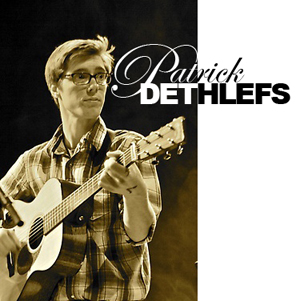




“Great things are done by a series of small things brought together.” - Vincent Van Gogh In the same way that the material world is composed of small things: of atoms, protons, quarks and forces – so too is the emotional, driven life of any physical being experienced in pieces and parts. In days, hours, minutes and quarters of the hour. These life particles are the blessing and the curse of existence. The moment is always beautiful, the moment is always terrible. For Patrick Dethlefs, a series of moments is exactly what has created his collaged, cubist sense of reality. Told in stories, Dethlef's is a painting of life recognized. Of moments as currency. Of now being more important than hope. Like his constitutional patchwork of moments, there is an imbroglio of elements that has drawn me to the work of the young Dethlefs. And it begins in that inferno where simplicity becomes complicated. Beyond that, what Dethlefs represents for this author is the motion of song as study. Experience as a solar system-sized schoolhouse. Music as an altar before the window to the world. + I believe in the profundity of simplicity. Of organic arrangements. Solitary instruments beneath the night. Crisp parables. The endlessness of everything taller than me. The first night I met Patrick Dethlefs he stood at the head of a darkened room with his acoustic guitar. He stood in front of a condenser microphone and half the world outside the doors of the bar. And, he was captivating. Charming. But he was also solitary. Everything about it was simple: on that stage was just Dethlefs, one guitar, one mic and one story at a time. I have carried with me one small, powerful maxim: what matters most are beautiful moments. The idea is simple, putting it into practice is difficult. This is what I feel about Patrick Dethlefs music: to find the simple, you must first profoundly understand – nay, toil – with the complicated cacophony of existence. + Perhaps the premier and defining series of moments for Dethlefs came just last year. Attending the Telluride Bluegrass Festival, Dethlefs approached Ben Sollee, the gifted cellist who once played in The Sparrow Quartet with Bela Fleck. Bravely, Dethlefs spoke with Sollee, giving him a copy of his recordings. Fast-forward to a time later: Dethlefs follows-up his initial meeting with Sollee, with an email. Sollee responds. He tells the kid that he listened to his stuff. And, he liked it. Sollee then came back through Colorado and they played a show together at the Oriental Theater. Then, Dethlefs went out to Kentucky to play and record with multi-talented Sollee. At the writing of this, Patrick Dethlefs is only 20 years old. But his songs feel aged, like the tradition that they call to. Perhaps this comes from the other defining moment of Dethlefs life – one that he both does and doesn’t let cage him: the death of his father. “Dad’s Song” is an honest, clean homage to the man that helped ignite the music that has become so central to his life. It is obvious why a father’s death could prove to be a fulcrum point, and agent for change in one’s life. But apart from the terrible sadness that his death put Dethlef’s family through – Patrick’s father continues to be a beacon of inspiration, an impetus for invention, a core of creation. Dethlef’s father played music. And it was because of this life at home, with his father and mother, why Dethlefs started playing trumpet and guitar at all. In his early teens, Dethlefs played electric. He had a band that was much different from the trail he blazes now. His father only saw him play live, once. It’s this idea coupled with the pride he knows his father would have had for this new direction, this bubbling of talent that he has produced – that help guide him. If not overtly, implicitly. To this day, Dethlefs most-prized possession is his father’s Martin D-41. For Dethlefs, his songs are a kind of secret celebration of his father and the life he gave his son. To this end, Dethlefs songs are not just pieces of music, they’re complete celebrations – of his life, his sister and mother’s life – our lives. Secret symphonies they are, always giving him a rope backwards – a way to relate to his long-gone dad. + Dethlefs’ music is personal. But, he gives them enough legs to roam away from the deepest, selfish core of his chest. After spending some time with the young songwriter and it was obvious: he is calculated. He spends time thinking and working scenarios through. He is conscious of himself in the middle of a room. But he is not too conscious that he becomes lost in neurosis. It should seem natural then that his songs are a bit like this. His stories are autobiographical, but also owing to the nature of traditional, passed-down music – he is also a fictional character that doesn’t live in his own skin. Under this gaslamp, he is the bard of his own life, his own tradition. He is the sole storyteller of his secret, undefined tradition, of his songs, of his sound. + Patrick Dethlefs’ songs are simple. For the most part they only consist of a group of chords, one key, a couple of runs, a riff, a vocal melody. Most popular music since the time of slave plantations has relied on this kind of simple structure to support the most important two other elements: a story, and a nod to some forlorn oral tradition. Dethlefs does play some traditionals, like “Diamond Joe” – which he owns a very independent take – and which display Dethlefs’ ability to stay in the middle of simple melodies and drive their power from them, squeezing them with his polite, at times lithe, voice. But he is not a bluegrass player. He is not a folkie. He is, well… something else. In the same way that we are in the post-modern age, or an age with no name – so too goes Patrick Dethlefs: his sound will find its name in time. But that time is not now. These days, he’s just pulling from every tree around him; unafraid to learn and grow into his own beanstalk. He is not a flashy guitar player. He never was. However, he is a strong storyteller. He is driven. Calculated. Charismatic. Ready. Patrick Dethlefs has that kind of magnetism that pulls people to him. Already, in his short time in the Denver music scene, he has turned the heads of some notable musicians and entire acts. In truth, he doesn’t make it very difficult for somebody to want to spend time with him, mentor him. You can feel it: he’s hungry. Smart. Talented. Ready. But, I don’t think he has it figured-out: any of it. Who he is, what he wants, what he sounds like, what he can sound like, look like, be. And this may be at the top his totem pole of virtues. For only at 20 years of age, Dethlefs’ eyes are wide. He knows he is on to something: Sollee confirmed that, the Birds and golden hammers and bands around him have emphasized that. But where he has spun-up some confidence, he has not let it inflate: he is too smart for that. Ask him a question and you’ll see: he’s not just going to give you any answer. He may not know what you’re saying and ask you to repeat what you’ve asked. Done gracefully, this is the antithesis of arrogance. This is humility. The truly great things in life were born from humility. Coursing through the great ones is humility. Because those that have toiled in life’s cacophonous torrents know that arrogance is evil. The eyes of arrogance are blind to the beautiful moments, the small moments, the profound moments. Great things and people are born from a series of small, beautiful moments brought together by humility. Remember Patrick Dethlefs, for his greatest moments are yet to come. www.patrickdethlefs.com |









